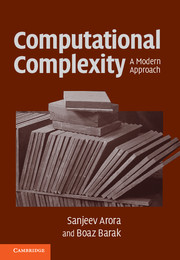Book contents
- Frontmatter
- Contents
- About this book
- Acknowledgments
- Introduction
- 0 Notational conventions
- PART ONE BASIC COMPLEXITY CLASSES
- PART TWO LOWER BOUNDS FOR CONCRETE COMPUTATIONAL MODELS
- PART THREE ADVANCED TOPICS
- 17 Complexity of counting
- 18 Average case complexity: Levin's theory
- 19 Hardness amplification and error-correcting codes
- 20 Derandomization
- 21 Pseudorandom constructions: Expanders and extractors
- 22 Proofs of PCP theorems and the Fourier transform technique
- 23 Why are circuit lower bounds so difficult?
- Appendix: Mathematical background
- Hints and selected exercises
- Main theorems and definitions
- Bibliography
- Index
- Complexity class index
19 - Hardness amplification and error-correcting codes
from PART THREE - ADVANCED TOPICS
Published online by Cambridge University Press: 05 June 2012
- Frontmatter
- Contents
- About this book
- Acknowledgments
- Introduction
- 0 Notational conventions
- PART ONE BASIC COMPLEXITY CLASSES
- PART TWO LOWER BOUNDS FOR CONCRETE COMPUTATIONAL MODELS
- PART THREE ADVANCED TOPICS
- 17 Complexity of counting
- 18 Average case complexity: Levin's theory
- 19 Hardness amplification and error-correcting codes
- 20 Derandomization
- 21 Pseudorandom constructions: Expanders and extractors
- 22 Proofs of PCP theorems and the Fourier transform technique
- 23 Why are circuit lower bounds so difficult?
- Appendix: Mathematical background
- Hints and selected exercises
- Main theorems and definitions
- Bibliography
- Index
- Complexity class index
Summary
Core: the heart of something, the center both literal and figurative.
–Columbia Guide to Standard American English, 1993Complexity theory studies the computational hardness of functions. In this chapter we are interested in functions that are hard to compute on the “average” instance, continuing a topic that played an important role in Chapters 9 and 18 and will do so again in Chapter 20. The special focus in this chapter is on techniques for amplifying hardness, which is useful in a host of contexts. In cryptography (see Chapter 9), hard functions are necessary to achieve secure encryption schemes of nontrivial key size. Many conjectured hard functions like factoring are only hard on a few instances, not all. Thus these functions do not suffice for some cryptographic applications, but via hardness amplification we can turn them into functions that do suffice. Another powerful application will be shown in Chapter 20–derandomization of the class BPP under worst-case complexity theoretic assumptions. Figure 19.1 contains a schematic view of this chapter's sections and the way their results are related to that result. In addition to their applications in complexity theory, the ideas covered in this chapter have had other uses, including new constructions of error-correcting codes and new algorithms in machine learning.
For simplicity we study hardness amplification in context of Boolean functions though this notion can apply to functions that are not Boolean-valued. Section 19.1 introduces the first technique for hardness amplification, namely, Yao's XOR Lemma.
Information
- Type
- Chapter
- Information
- Computational ComplexityA Modern Approach, pp. 373 - 401Publisher: Cambridge University PressPrint publication year: 2009
